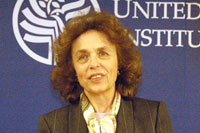Haleh Esfandiari's family worries about her fate
The only contact Haleh Esfandiari's family has with her are short phone calls. They usually come in the evening to her 93-year-old mother's home in Tehran. Esfandiari is fine, sometimes asks about her grandchildren, but is always cut off after a minute.

Those are the few clues about Esfandiari's fate since the 67-year-old scholar arrested in Iran in early May, accused of trying to undermine and topple Iran's hard-line government by opening up the country to the West.
Esfandieri, an Iranian-American who holds dual citizenship, works on Middle East issues at the Woodrow Wilson International Center for Scholars in Washington.
Her family has heard nothing from the Iranian government, and lawyers and Esfandiari's mother have been barred from visiting her. Back in the Washington area, her husband and daughter worry about conditions at Tehran's Evin Prison, where late-night, blindfolded interrogations are said to take place.
"There have been much stronger men in their 20s and 30s who have broken under this process," said her husband, Shaul Bakhash, a Middle East scholar at George Mason University. "So I worry a great deal."
Two other Iranian-Americans, journalist Parnaz Azima and Kian Tajbakhsh, a consultant for George Soros' Open Society Institute, have been recently detained or prevented from leaving Iran as the hard-line government cracks down on non-governmental organizations. A former FBI agent, Robert Levinson, disappeared in Iran in March.
On Thursday, President George W. Bush denounced the detentions, saying the country's actions were "not acceptable behavior." The Wilson Center has called for Esfandiari's release, as have several academic groups and American presidential candidates. Shirin Ebadi, the Iranian lawyer who won the 2003 Nobel Peace Prize, has agreed to represent her.
Family members disputed allegations Esfandiari sought to overthrow Iran's government seem absurd.
"It's total nonsense," said her daughter, Haleh Bakhash. "My mother's work has always been purely academic. She has never been a political person at all."
Shaul Bakhash met Esfandiari in the early 1960s when both were reporters at the Iranian newspaper Kayhan.
Esfandiari has always been a "firebrand of activity," both in her work and her tennis game, according to her husband. She loves to make bets, wagering small sums on everyday things.
The couple and their daughter left the country around the 1979 Iranian Revolution, eventually settling in Princeton, New Jerssey, where Bakhash taught history at Princeton University and his wife held classes in Persian literature and language.
At Princeton, she would recite Persian poetry by heart and join student Persian discussion groups. She was a mother figure to many students in her classes.
"This is somebody who has inculcated in a generation of students a love for Iran and Persian culture. For that aspect, they more or less have got the wrong person," said Jon Katz, who worked with Esfandiari as a graduate student.
Esfandiari was later hired by the Wilson Center, where her work included workshops to encourage women in overseas countries to get involved in politics and public life. Some of the women in the new Iraqi government attended her seminars.
Family members said they have no idea what legal process, if any, she faces in Iran. They hope the political pressure will force Iran to set her free.
"My fear is that I will never see her again," Bakhash said.
Subscribe to Pravda.Ru Telegram channel, Facebook, RSS!


